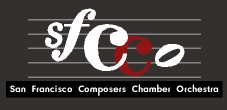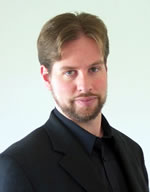SAN FRANCISCO COMPOSERS CHAMBER ORCHESTRA
Presents "Under Deconstruction"
Saturday, May 4, 2019 at 8 pm
St. Teresa of Avila Catholic Church
1490 19th Street, San Francisco, CA
|
Davide Verotta was born in a boring Italian town close to Milano and moved to the very much more exciting San Francisco in his late twenties. He studied piano at the Milano Conservatory and piano and composition at the San Francisco Conservatory and State University (MA in composition), and at the University of California at Davis (PhD). He is an active solo and ensemble piano recitalist, and he is actively involved in the new music performance and composition scene in the San Francisco Bay Area. Recent compositions include works for orchestra, chamber opera, dance, piano solo, and different chamber ensembles. For more information please visit his web site at http://www.davideverotta.com. |
|
|
The multi-instrumentalist Michael Cooke is a composer of jazz and classical music. This two-time Emmy, ASCAPLUS Award and Louis Armstrong Jazz Award winner plays a variety of instruments: you can hear him on soprano, alto, and tenor saxophones, flute, soprano and bass clarinets, bassoon and percussion. A cum laude graduate with a music degree from the University of North Texas, he had many different areas of study; jazz, ethnomusicology, music history, theory and of course composition. In 1991 Michael began his professional orchestral career performing in many north Texas area symphonies. Michael has played in Europe, Mexico, and all over the United States. Cimarron Music Press began published many of Michael's compositions in 1994. After relocating to the San Francisco Bay Area, he has been exploring new paths in improvised and composed music, mixing a variety of styles and techniques that draw upon the creative energy of a multicultural experience, both in and out of America. In 1999, Michael started a jazz label called Black Hat Records (blackhatrecords.com) and is currently on the Board of Directors of the San Francisco Composers Chamber Orchestra. The San Francisco Beacon describes Michael's music as "flowing out color and tone with a feeling I haven't heard in quite a while. Michael plays with such dimension and flavor that it sets (his) sound apart from the rest." Uncompromising, fiery, complex, passionate, and cathartic is how the All Music Guide labeled Michael's playing on Searching by Cooke Quartet, Statements by Michael Cooke and The Is by CKW Trio. His latest release, An Indefinite Suspension of The Possible, is an unusual mixture of woodwinds, trombone, cello, koto and percussion, creating a distinct synergy in improvised music that has previously been untapped. Michael Cox has been making music with his horn for 30+ years. At the Rice University Shepherd School of Music and the Cleveland Institute of Music, his teachers included Mark Hughes, Michael Sachs, and David Bilger. A huge fan of musical theater, he previously played Fiddler on the Roof, Sister Act and West Side Story at the Berkeley Playhouse. Some of the many fine local groups he enjoys jamming with: San Francisco Composers Chamber Orchestra, Lafayette Big Band, and Bay Area Classical Harmonies Orchestra. Besides music, Michael spent 17 years at Electronic Arts where he was a producer of SimCity and Sims games. |
|
|
Davide Verotta was born in a boring Italian town close to Milano and moved to the very much more exciting San Francisco in his late twenties. He studied piano at the Milano Conservatory and piano and composition at the San Francisco Conservatory and State University (MA in composition), and at the University of California at Davis (PhD). He is an active solo and ensemble piano recitalist, and he is actively involved in the new music performance and composition scene in the San Francisco Bay Area. Recent compositions include works for orchestra, chamber opera, dance, piano solo, and different chamber ensembles. For more information please visit his web site at http://www.davideverotta.com. |
|
|
The multi-instrumentalist Michael Cooke is a composer of jazz and classical music. This two-time Emmy, ASCAPLUS Award and Louis Armstrong Jazz Award winner plays a variety of instruments: you can hear him on soprano, alto, and tenor saxophones, flute, soprano and bass clarinets, bassoon and percussion. A cum laude graduate with a music degree from the University of North Texas, he had many different areas of study; jazz, ethnomusicology, music history, theory and of course composition. In 1991 Michael began his professional orchestral career performing in many north Texas area symphonies. Michael has played in Europe, Mexico, and all over the United States. Cimarron Music Press began published many of Michael's compositions in 1994. After relocating to the San Francisco Bay Area, he has been exploring new paths in improvised and composed music, mixing a variety of styles and techniques that draw upon the creative energy of a multicultural experience, both in and out of America. In 1999, Michael started a jazz label called Black Hat Records (blackhatrecords.com) and is currently on the Board of Directors of the San Francisco Composers Chamber Orchestra. The San Francisco Beacon describes Michael's music as "flowing out color and tone with a feeling I haven't heard in quite a while. Michael plays with such dimension and flavor that it sets (his) sound apart from the rest." Uncompromising, fiery, complex, passionate, and cathartic is how the All Music Guide labeled Michael's playing on Searching by Cooke Quartet, Statements by Michael Cooke and The Is by CKW Trio. His latest release, An Indefinite Suspension of The Possible, is an unusual mixture of woodwinds, trombone, cello, koto and percussion, creating a distinct synergy in improvised music that has previously been untapped. |
Symphony No. 4 ("Deconstructing Beethoven") III. Tempo di Menuetto |
|
Dr. Mark Alburger (1957-2023, Upper Darby, PA) was an award-winning, eclectic ASCAP composer with postminimal, postpopular, and postcomedic sensibilities. He was the Music Director of SF Composers Chamber Orchestra, SF Cabaret Opera / Goat Hall Productions, and The Opus Project; Editor-Publisher of 21st-Century Music and New Music; Adjunct Professor Emeritus of Music Theory and Literature at Diablo Valley College; and a Musicologist for Grove Online and Grove Dictionary of American Music. His principal teachers were Gerald Levinson and Joan Panetti (Swarthmore College, B.A.); Jules Langert (Dominican University, M.A.); Christopher Yavelow (Claremont University, Ph.D.); and Terry Riley. Dr. Alburger had composed 399 major works, including chamber music, concertos, oratorios, operas, song cycles, and symphonies. His complete catalogue was available from New Music. (markalburgerworks.blogspot.com) |
I. Bourgeois Ouverture (Comedie-Ballet) |
|
Dr. Mark Alburger (1957-2023, Upper Darby, PA) was an award-winning, eclectic ASCAP composer with postminimal, postpopular, and postcomedic sensibilities. He was the Music Director of SF Composers Chamber Orchestra, SF Cabaret Opera / Goat Hall Productions, and The Opus Project; Editor-Publisher of 21st-Century Music and New Music; Adjunct Professor Emeritus of Music Theory and Literature at Diablo Valley College; and a Musicologist for Grove Online and Grove Dictionary of American Music. His principal teachers were Gerald Levinson and Joan Panetti (Swarthmore College, B.A.); Jules Langert (Dominican University, M.A.); Christopher Yavelow (Claremont University, Ph.D.); and Terry Riley. Dr. Alburger had composed 399 major works, including chamber music, concertos, oratorios, operas, song cycles, and symphonies. His complete catalogue was available from New Music. (markalburgerworks.blogspot.com) |
Chapter I. I Am the Alpha |
John Beeman studied with Peter Fricker and William Bergsma at the University of Washington where he received his Master's degree. His first opera, The Great American Dinner Table was produced on National Public Radio. Orchestral works have been performed by the Fremont-Newark Philharmonic, Santa Rosa Symphony, and the Peninsula Symphony. The composer's second opera, Law Offices, premiered in San Francisco in 1996 and was performed again in 1998 on the steps of the San Mateo County Courthouse. Concerto for Electric Guitar and Orchestra was premiered in January 2001 by Paul Dresher, electric guitar. Mr. Beeman has attended the Ernest Bloch Composers' Symposium, the Bard Composer-Conductor program, the Oxford Summer Institutes, and the Oregon Bach Festival and has received awards through Meet the Composer, the American Music Center and ASCAP. Compositions have been performed by Ensemble Sorelle, the Mission Chamber Orchestra, the Ives Quartet, Fireworks Ensemble, the Oregon Repertory Singers and Schola Cantorum of San Francisco. Carla Brooke, Librettist |
Scene 9 Robert Vann, Ishi |
![]() Click on the links to listen to the music.
Click on the links to listen to the music. ![]() Click on the links for video.
Click on the links for video.
| Piccolo / Flute Oboe Clarinet / Bass Clarinet Alto Saxophone Bassoon |
Trumpet Horn Piano Percussion |
Violin
I Violin II Viola Cello Bass
|


 Dr. Mark Alburger was the Music Director, Conductor, and founder of the San Francisco Composers Chamber Orchestra. Mark was an eclectic American composer known for his postminimal, postpopular, and postcomedic sensibilities. He served as the Music Director of Goat Hall Productions / San Francisco Cabaret Opera, Editor-Publisher of 21st-Century Music Journal, an award-winning ASCAP composer of concert music published by New Music, an Instructor in Music Theory and Literature at Diablo Valley College, a Music Critic for Commuter Times, an author, musicologist, oboist, pianist, and recording artist.
Dr. Mark Alburger was the Music Director, Conductor, and founder of the San Francisco Composers Chamber Orchestra. Mark was an eclectic American composer known for his postminimal, postpopular, and postcomedic sensibilities. He served as the Music Director of Goat Hall Productions / San Francisco Cabaret Opera, Editor-Publisher of 21st-Century Music Journal, an award-winning ASCAP composer of concert music published by New Music, an Instructor in Music Theory and Literature at Diablo Valley College, a Music Critic for Commuter Times, an author, musicologist, oboist, pianist, and recording artist. John Kendall Bailey is an Associate Conductor with the San Francisco Composers Chamber Orchestra and is Principal Conductor and Chorus Master of the Trinity Lyric Opera, Music Director and Conductor of Voices of Musica Sacra, and Artistic Director of the San Francisco Song Festival. In 1994, Mr. Bailey founded the Berkeley Lyric Opera and served as its Music Director and Conductor until 2001. Since then he has been a guest conductor with the Oakland East Bay Symphony, Oakland Youth Orchestra, and Oakland Ballet, and music director and conductor for productions with North Bay Opera, Mission City Opera, Goat Hall Productions, Solo Opera, the Crowden School and Dominican University. From 2002-2006 he was the Chorus Master of the Festival Opera of Walnut Creek. Mr. Bailey is also a composer, and his works have been performed and commissioned in the Bay Area and abroad.
John Kendall Bailey is an Associate Conductor with the San Francisco Composers Chamber Orchestra and is Principal Conductor and Chorus Master of the Trinity Lyric Opera, Music Director and Conductor of Voices of Musica Sacra, and Artistic Director of the San Francisco Song Festival. In 1994, Mr. Bailey founded the Berkeley Lyric Opera and served as its Music Director and Conductor until 2001. Since then he has been a guest conductor with the Oakland East Bay Symphony, Oakland Youth Orchestra, and Oakland Ballet, and music director and conductor for productions with North Bay Opera, Mission City Opera, Goat Hall Productions, Solo Opera, the Crowden School and Dominican University. From 2002-2006 he was the Chorus Master of the Festival Opera of Walnut Creek. Mr. Bailey is also a composer, and his works have been performed and commissioned in the Bay Area and abroad.